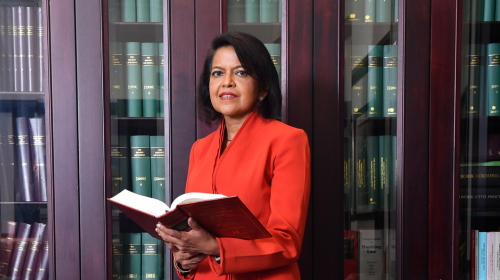International Women’s Day 2025: Interview with Justice Nallini Pathmanathan of the Federal Court of Malaysia

International Women’s Day (IWD) is held on 8 March every year. It is a global day celebrating the social, economic, cultural, and political achievements of women. The day also marks a call to action for accelerating women’s equality. The IWD 2025 campaign theme is Accelerate Action, emphasising the importance of taking swift and decisive steps to achieve gender equality. In this interview, international judge Justice Nallini Pathmanathan shares her experiences and reflects on the importance of IWD.
Can you briefly introduce yourself and your current role?
I have been a judge of the Federal Court of Malaysia since 2018. This is the apex court, the highest court in our legal system. I enjoy the privilege of being the first female judge of South Asian ethnicity to be elevated to the superior judiciary in Malaysia.
What is your background and career journey so far?
My initial background is in the sciences. I studied physiology as a first degree at the University of London. I then undertook a conversion course in law in 1983, prior to being called to the Bar at Middle Temple in the UK in 1984, and the Malaysian Bar in 1986.
I went on to practice at the Bar in Kuala Lumpur at Messrs Skrine, where I remained for 21 years prior to being elevated to the Bench in March 2007. My practice was initially in family and industrial relations law, later moving on to commercial law.
I am a Bencher of The Honourable Society of the Middle Temple and sit on the Steering Group of the Standing International Forum of Commercial Courts (SIFoCC).
What made you decide to pursue a career in law and/or justice?
Law was not my initial choice of career. Coming from a family with a strong background in medicine, I always envisioned myself as a doctor. However, when my attempt at pursuing medicine was unsuccessful, I went on to study physiology and then moved on to the law, at my father’s suggestion. From the moment I began learning the law, I enjoyed it.
Are there any women who have inspired you in your life and/or career?
I cannot single out any one woman. Both women and men across various fields have been sources of inspiration in my career. However, the recent increase in female appointments to high judicial office is inspiring. They include the Chief Justice of Malaysia, Tengku Maimun Tuan Mat; the Lady Chief Justice of England and Wales, Baroness Sue Carr; Justice B. V. Nagarathna of the Supreme Court of India; Justice Ayesha Malik the first female judge of the Supreme Court of Pakistan; and Lady Justice Martha Karambu Koome, the Chief Justice of Kenya. There are many more inspirational figures, too many to name here.
The theme of International Women’s Day this year is ‘Accelerate Action’ – what does this mean to you?
People who have achieved high office have a duty to address the issue, that women have for millennia been pushed to the back. For example, they should ensure that there are sufficient opportunities for women to advance, based on ability and talent, and flexible working practices, as women often bear responsibility for childcare and managing the home.
Another step would be to provide access to leadership training for women, and policies for advancement which are clear, well-known to stakeholders and applied equitably. Mentoring can also be an essential part of training within the legal profession. Initiatives like these should be targeted, as no one solution fits the legal profession in every jurisdiction. The International Bar Association researched this important topic in its 50:50 by 2030: Progress Report 2024.
Finally, these steps cannot be cosmetic. Reducing gender disparity should be a part of the culture built into organisations and institutions.
Horizontal segregation (the under or over-representation of a gender in a particular occupation or industry) should be eliminated. It prevents women in the profession from being pushed into particular types of less well-paying work, and allows them to practice in the more high profile and lucrative sectors, should they choose to do so.
What advice would you give to any women or girls who want to pursue a career in law and/or justice?
I would advise them to explore and understand the profession they are embarking on. The rate of attrition is high amongst women legal practitioners in Malaysia.
I would also advise them never to underestimate their own abilities as they are equally competent to their male counterparts.
Finally, I would say the law is a career you should consider pursuing. It affords fulfillment at all levels, whether you are arguing your first case as junior counsel or submitting as senior counsel on complex points of law at the highest level.
